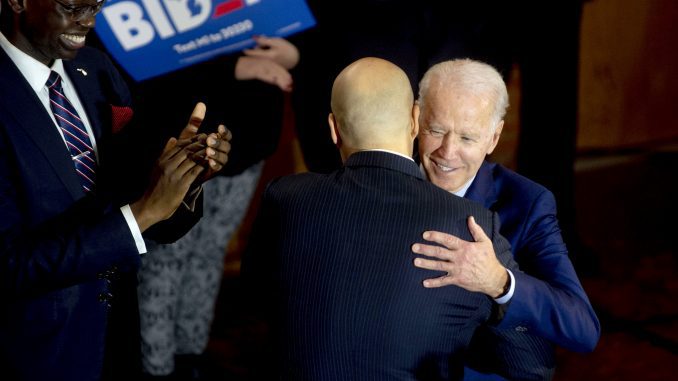
LANSING, Mich. — A resurgent Joe Biden continued his momentum Tuesday by winning Michigan’s Democratic primary, denying Bernie Sanders’ attempt to rekindle his presidential campaign in what will be a presidential battleground in November.
The primary was the largest delegate prize in this week’s slate of contests, which came one week after Biden’s big Super Tuesday wins winnowed the field. Michigan is part of the “blue wall” that flipped to Donald Trump in 2016, and Sanders campaigned heavily here in the closing days in hopes of repeating his primary victory four years ago.
But voters backed Biden, the former vice president who pointed to the auto bailout under President Barack Obama and pledged to expand health coverage.
Voters enjoyed expanded rights in Michigan’s first major election since the approval of a 2018 constitutional amendment that resulted in a surge of early voting, which began in late January. People who now can cast an absentee ballot without needing an excuse took advantage, submitting 804,000 through Monday — compared with 447,000 at the same point in 2016 when there was a competitive Republican primary.
Turnout was higher on the Democratic side than it was four years ago, with more than 1.45 million votes counted and 86% of precincts reporting — up from 1.2 million.
The swell of absentee ballots, combined with so many Democratic candidates dropping out — especially since South Carolina and Super Tuesday — led to spikes in the number of voters scratching their ballots and submitting a new one. More than 36,000 ballots were “spoiled,” an eight-fold increase over 2016.
The trend likely benefited Biden as the party’s more moderate wing consolidated around him. Many states do not allow such do-overs.
Michigan’s influence was apparent from candidates’ visits in recent days.
Sanders, a senator from Vermont, urged large crowds to “think big” and embrace his plans to cancel student debt and guarantee health care for all. He criticized Biden’s record on trade, saying his support for the North American Free Trade Agreement more than 25 years ago would give Trump an edge in battleground Michigan in November.
Biden was joined on the trail by Gov. Gretchen Whitmer along with Sens. Cory Booker and Kamala Harris — two former rivals for the nomination. He touted “Obamacare” and said it should be expanded with a Medicare-like “public option,” not scrapped with a single-payer system that would supplant private insurance.
Several voters said they were motivated to nominate a strong Trump challenger and did not believe Sanders would match up well.
“Some people may not look kindly on his, quote, socialistic comments,” said Karen Gagnier, 64, of Grosse Pointe Woods. “That doesn’t bother me, but I’m looking for the candidate with the best possibility of success.”
Zelda Solomons, 67, of Grosse Pointe Park, said it was not hard to vote for Biden.
“I’m sure Biden is going to carry Obama’s policies. They were good partners,” she said. “I’m ready for someone who’s sensible.”
Larisa Leveck, 24, voted absentee for Sanders in the small town of Ovid north of Lansing.
“He’s the only one who’s got the platforms that I need,” she said, citing his stances on climate change, health care, money in politics, and making public universities and colleges free.
Ned Herman of St. Clair Shores is a Trump supporter. But he said he took a Democratic ballot and voted for Sanders because he fears Biden would be a tough opponent in November.
“The only word I can say is sabotage,” Herman, 49, said with a grin.
This was the first statewide contest in which people could register to vote at any time without a deadline, including on Election Day.
Secretary of State Jocelyn Benson said the option led to long lines in Ann Arbor, East Lansing, Kalamazoo, Grand Rapids and Dearborn.
“They’re required by law to register and vote in one location,” Benson said. “This meant the infrastructure that was set up to handle maybe 10 or 20 or 30 registrations … now had to grapple with hundreds of people showing up.”
She said the answer might be satellite locations in November in some communities.
“We need more people involved in our democracy on Election Day,” Benson said. “My call is to employers and others throughout our state to give their employees the day off this November to serve as poll workers and election workers.”
Sharon Dolente, the voting rights strategist for the ACLU of Michigan, said local election offices should have been more prepared for a crush of college students registering.
“Many folks could have assumed and would have assumed that on university campuses and communities with universities, that demand would have been great,” she said.


